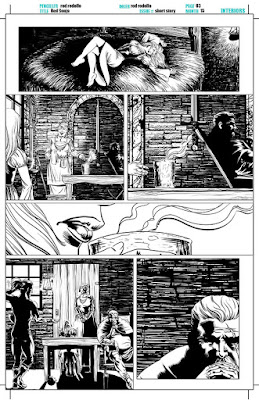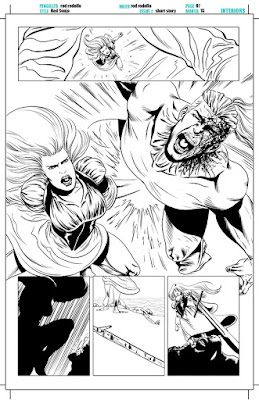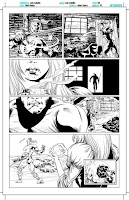 Have you ever wondered how an artist can tell a story through a series of visual illustrations? If so, then please try to cast your mind back to the silent era of filmmaking, where an actor, like Charlie Chaplin or Mary Pickford, would be able to guide us through an adventure one frame at a time. There are obviously a lot of elements to think about when you tell a story with a series of static images, such as, facial and body expressions, the juxtaposition of the panels on a page, and the numerous angles and framing of a scene, all of which should be conveyed to tell the story somewhat efficiently.
Have you ever wondered how an artist can tell a story through a series of visual illustrations? If so, then please try to cast your mind back to the silent era of filmmaking, where an actor, like Charlie Chaplin or Mary Pickford, would be able to guide us through an adventure one frame at a time. There are obviously a lot of elements to think about when you tell a story with a series of static images, such as, facial and body expressions, the juxtaposition of the panels on a page, and the numerous angles and framing of a scene, all of which should be conveyed to tell the story somewhat efficiently.
Rhythm is another structural element that aides in comic book storytelling. Just try to think of it as the pattern of regular, or irregular, pulses caused in music by the occurrence of strong or weak melodic and harmonic sounds: bam, Bam, bam, Bam, BAAAAAAMMMMM!!!! Basically, the size and juxtaposition of your panels will determine it's importance and rhythm in your story.
 The ability to convey timing in a comic book sequence is very critical to its success, as it’s an essential structural element people use when it comes down to telling a story. In everyday life we use tools, like a clock, to measure the nature of time, yet timing in comic books is where an action is extended to enhance emotional intensity.
The ability to convey timing in a comic book sequence is very critical to its success, as it’s an essential structural element people use when it comes down to telling a story. In everyday life we use tools, like a clock, to measure the nature of time, yet timing in comic books is where an action is extended to enhance emotional intensity.A good example of this can usually be seen at the end of a melodramatic movie when a hero kisses his girl goodbye. The two of them are at the beach, during sunset, which establishes the mood of a scene, coupled with the fact that we are seeing a wide camera angle shot of them both running towards each other from opposite ends of the screen. Then suddenly there is a close-up of the girl's face, quickly followed by the hero's face, before we are presented with numerous other close-up shots focused on their feet running in the sand, their chests going up and down, and their mouths quivering with anticipation and excitement. After a while, these two lovers get closer and closer together, which is duly noted by some lavish romantic music and a bold and suggestive close-up on her lips, a close-up on his eyes, a close-up on her, a close-up on him, on her, on him, on her, on him, until, eventually, the hero trips over a sea-shell and falls flat on his face. Ops! End scene.
Another example of appropriate timing and the emotional enhancement of a scene can be seen in the following video clip from the Teen Titans TV show. Please, check it out, and try to take note of how the music is timed to coincide with the moment of the kiss…

When you create a layout for a scene, please consider the option of using panels of grids to make things easier for you. Admittedly, it all depends on what type of a scenario you want to tell, plus what rhythm, timing, and emotion you want the reader to feel. Although you must remember that emotion is our currency here, and everything we do should be aimed to enhance the story and that big emotional scene where everyone cries and applauds at the end! Seriously, you have to ask yourself: What kind of feelings do you want your readers to experience and how can you make it happen in the story?
Here, let me give you two suggestions on grid layouts you can use as a reference to create your own grids and layout structure. Every artist should be free enough to choose whatever they feel is right to convey an emotion and tell the story, and of course, these grids are only suggestions and you should not be tied into these. But that said, they are still a very good source of reference.
 |
The 9 Panel Grid:
Used in Watchmen
By David Gibbons
|
 |
The 16 Panel Grid:
Used in The Dark Knight Returns
By Frank Miller
|
This article was brought to you by Brazilian born, Rod Rodollfo from Alpha Brain Art Studio. Please feel free to download the Master Page Template used by Rod on many Published Comic Books by clicking here! And while you're at it, don't forget to follow him on his website, twitter, and facebook pages.
THE ARTIST'S JOURNEY - LESSON SEVEN: STORYTELLING, RHYTHM, AND TIMING
 Reviewed by David Andrews
on
April 11, 2018
Rating:
Reviewed by David Andrews
on
April 11, 2018
Rating:
 Reviewed by David Andrews
on
April 11, 2018
Rating:
Reviewed by David Andrews
on
April 11, 2018
Rating:






No comments:
Post a Comment